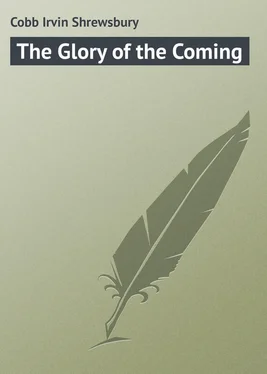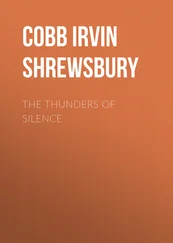Irvin Cobb - The Glory of the Coming
Здесь есть возможность читать онлайн «Irvin Cobb - The Glory of the Coming» — ознакомительный отрывок электронной книги совершенно бесплатно, а после прочтения отрывка купить полную версию. В некоторых случаях можно слушать аудио, скачать через торрент в формате fb2 и присутствует краткое содержание. Жанр: foreign_prose, foreign_language, на английском языке. Описание произведения, (предисловие) а так же отзывы посетителей доступны на портале библиотеки ЛибКат.
- Название:The Glory of the Coming
- Автор:
- Жанр:
- Год:неизвестен
- ISBN:нет данных
- Рейтинг книги:3 / 5. Голосов: 1
-
Избранное:Добавить в избранное
- Отзывы:
-
Ваша оценка:
- 60
- 1
- 2
- 3
- 4
- 5
The Glory of the Coming: краткое содержание, описание и аннотация
Предлагаем к чтению аннотацию, описание, краткое содержание или предисловие (зависит от того, что написал сам автор книги «The Glory of the Coming»). Если вы не нашли необходимую информацию о книге — напишите в комментариях, мы постараемся отыскать её.
The Glory of the Coming — читать онлайн ознакомительный отрывок
Ниже представлен текст книги, разбитый по страницам. Система сохранения места последней прочитанной страницы, позволяет с удобством читать онлайн бесплатно книгу «The Glory of the Coming», без необходимости каждый раз заново искать на чём Вы остановились. Поставьте закладку, и сможете в любой момент перейти на страницу, на которой закончили чтение.
Интервал:
Закладка:
“That wasn’t all of it, either,” he went on. ‘’Naturally there were some men who had been off on detail of one sort or another and hadn’t been at parade. When they came last night and found out what had happened in their absence – well, they simply raised merry blue hell, that’s all. They figured somehow they’d been cheated. As a result I may say that my rest was somewhat broken. Every few minutes, all night long, some boy would break into my room, and in the doorway salute and say, in a broken-hearted way: ‘Now look here, major, this ain’t square. I got as much right to go over the top as any feller in this regiment has, and just because I happened to be away this evenin’ here I am chiselled out of my chance to go along. Can’t you please, sir, ask the adjutant or somebody to let me in on this?’
“That substantially was what every one of them said. And when I turned them down some of ‘em went away crying like babies.”
He glanced away across the blue hill. “I guess maybe I did a little crying myself.”
I thought about what the major had said and what the colonel had said and what I myself had seen after I had climbed some shaky stairs to be bedded down for the night on a pallet of blankets upon the floor of a room where several tired-out officers already snored away, oblivious of the reverberations of the shelling from our guns and from the enemy’s, which went on until nearly daybreak.
In the morning I got insight into another phase of the enlisted Yank’s understanding. We came downstairs to breakfast – to a Sunday morning breakfast. For the moment a Sabbath calm hung over the wrecked town and over the country roundabout; all was as peaceful as a Quaker meeting. Red, the colonel’s orderly, stood in the doorway picking his teeth. Red is six feet two inches tall, and disproportionately narrow. He is a member of a regiment recruited in the Middle West, but he hails from the Panhandle of Texas, and betrays the fact every time he opens his mouth. At the moment of our approach he was addressing an unseen and presumably a sympathetic listener beyond the threshold:
“Me, I’m, plum’ outdone with these here French people,” I heard him drawl. “Here we’ve been camped amongst ‘em fer goin’ on four months and they ain’t learnt English yet. You’d think they’d want to know how to talk to people in a reg’lar honest-to-God language – but no, seein’ seemin’ly not a-tall. I’d be ashamed to be so ignorunt and show it. Course oncet in a while you do run acrost one of ‘em that’s picked up a word here and there; but that’s about all.
“Now frinstance you take that nice-lookin’ little woman with the black eyes and the shiny teeth that runs that there little store in this here last town we stayed a spell in before we come on up here. I never could remember the name of that there town – it was so outlandish soundin’ – but you remember the woman, don’t you? Well, there’s a case in p’int. She was bright enough lookin’ but she was like all the rest – it seemed like she jest couldn’t or jest wouldn’t pick up enough reg’lar words to help her git around. Ef I went in her place and asked her fer sardines she’d know what I meant right off and hand ‘em over, but ef I wanted some cheese she didn’t have no idea whut I was talkin’ about. Don’t it jest beat all!”
CHAPTER IV. ON THE THRESHOLD OF BATTLE
WE left Paris at an early hour of March 25, which was the morning of the fourth day of perhaps the greatest battle in the history of this or any other war, and of the third day of the bombardment of Paris by the long-range steel monster which already had become famous as the latest creation of the Essen workshops.
There were three of us and no more – Raymond Carroll, Martin Green and I. To each of the three the present excursion was in the nature of a reunion. For more than six years we held down adjoining desks in the city room of a New York evening newspaper. Since we parted, Carroll and I to take other berths and Green to bide where he was, this had been the first time we had met on the same assignment.
I counted myself lucky to be in their company, for two better newspaper men never walked in shoe leather. Carroll among reporters is what Elihu Root is among corporation lawyers. There are plenty of men in the journalistic craft who know why certain facts pertinent to the proper telling of a tale in print may not be secured; he, better than almost any man I ever ran across in this business, knows how these facts may be had, regardless of intervening obstacles. In his own peculiar way, which is a calm, quiet, detached way, Green is just as effective. When it comes to figuring where unshirted Hades is going to break loose next and getting first upon the spot he is a regular Nathan Bedford Forrest. His North American sanity, which is his by birth, and his South of Ireland wit, which is his by inheritance, give strength and savour to what he writes once he has assembled the details in that card index of a mind of his.
We left Paris, heading north by east in the direction whence came in dim reverberations the never-ending sound of the big guns firing in the biggest of all big engagements. Through the courtesy of friends who are members of the French Government we bore special passes admitting us to the Soissons area. Later we were to learn that we were the only individuals not actively concerned in military operations who at particularly momentous time had been thus favoured, all other such passes having been cancelled; and by the same lucky token we are, I believe, the only three newspaper men of any nationality whatsoever who may lay claim to having witnessed at first-hand any part of the close-up fighting in the most critical period and at one of the most critical spots along the crest of the culminating German offensive of this present year of grace and gunpowder, 1918.
Indeed, so far as the available information goes, I think we were the only practitioners of the writing trade who actually got to the actual Front in the first week of the push. Whether any of our calling have got there in the succeeding weeks, I doubt. These times the war correspondent, so called, does not often enjoy such opportunities. After the army has dug itself in is another matter; then, within limitations, he may go pretty much where he pleases to go. But when the shove is on he stays behind, safely at the rear with the rest of the camp followers, and compiles his dispatches from the official communications, fatting them out with details out of the accounts of eyewitnesses and occasionally of participants.
For the three of us, though, was to be vouchsafed the chance which comes but once in the modern newspaperman’s life, and sometimes not then. By a combination of rare luck and yet more rare luck we not only got to the Front but we got clear through it. As I write these lines I figuratively pat myself on the back at the thought of having seen what I never expected to see when I landed on French soil less than a month ago. At the same time it behooves me to disclaim for the members of our party that any special sagacity on our part figured in the transaction. Good fortune came flitting along and perched on our shoulders, that’s all.
If our passes had shared the common fate of those other passes in being annulled, if any one charged with authority had seen fit to halt us, if any one of a half dozen other things had or had not befallen us – we never should have gone where we did go.
Except that we three were the only passengers on the train who did hot wear French uniforms, and except that the train ran very slowly, nothing happened on the journey to distinguish it from any other wartime journey on a railroad where always there is to be heard the distant booming of the guns mingling with the clickety-clank of the car wheels, and where always the sight of all manner of military activities is to be viewed from the car windows.
Читать дальшеИнтервал:
Закладка:
Похожие книги на «The Glory of the Coming»
Представляем Вашему вниманию похожие книги на «The Glory of the Coming» списком для выбора. Мы отобрали схожую по названию и смыслу литературу в надежде предоставить читателям больше вариантов отыскать новые, интересные, ещё непрочитанные произведения.
Обсуждение, отзывы о книге «The Glory of the Coming» и просто собственные мнения читателей. Оставьте ваши комментарии, напишите, что Вы думаете о произведении, его смысле или главных героях. Укажите что конкретно понравилось, а что нет, и почему Вы так считаете.












